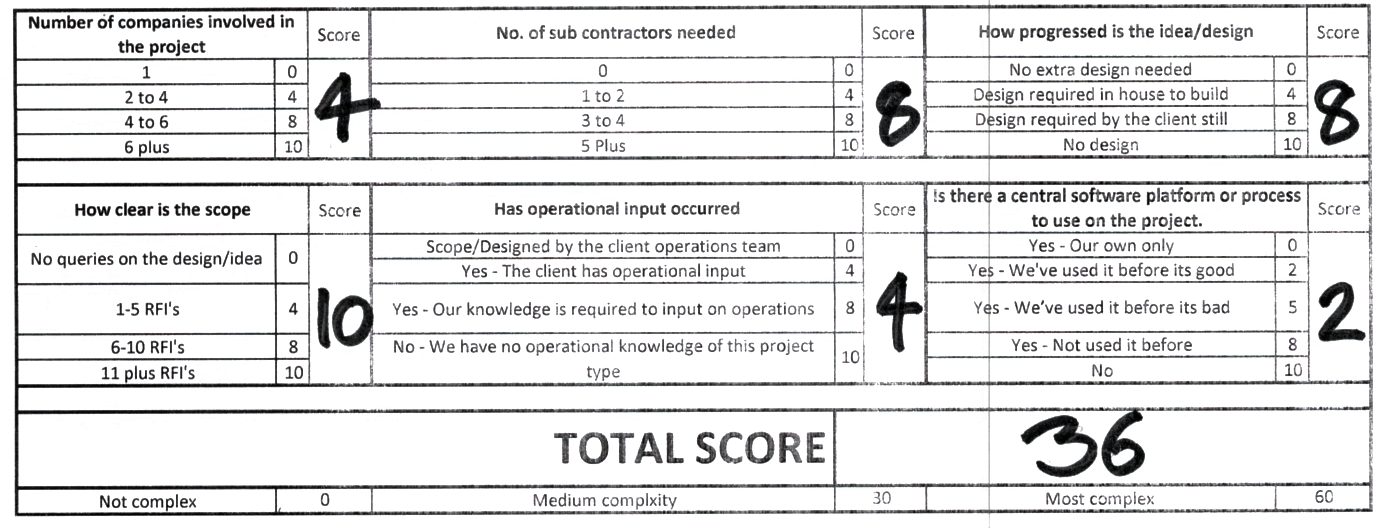|
How do you describe your project to people? What’s the headline reason why you are doing it? Do you look at its value, do you look at its predicted profit, is it how nice the client is, do you look at its prestige? If you’re lucky all of these. But the reality is that none of these affect its outcome, success or viability. Most people will blurt these headline grabbers. “It’s worth £2 million! We’re on for 40% profit! We’ve worked with so and so before and they were great! This is a great opportunity for us to get more work.” These are easy things to compute, they make life simple and we all want things simple, but they are simply …. noise…. No action. IDEA After 20 plus years of projects, I can tell you that none of these affect the outcome .. they are sales blurts .. headlines .. yes they make the project easy to sell, it’s the gift wrap and they soon get discarded when the real project is opened. Complexity is how you should rate your projects, that dictates if the present is good or bad? Lets look at a simple example… A £50,000 project can be the simplest to manage if it’s repeating the same thing a thousand times. A £50,000 project can be the most complex to manage if there is no design, it needs 5 companies input and there is no one to direct questions to. The complexity of how you manage the project has the real effect on the outcome and if you understand the complexity of a project, you are set to make the best out of a project for yourself and the client. Complexity comes in many forms but under 3 broad headings.
The more complexity, the more unpredictable the outcome, which is not all bad because with complexity and variables comes opportunities. SYNOPSIS So, if the headlines don’t affect the success of a project but complexity does, how do we keep this simple enough to communicate that potential success? After all life’s to short to explain the inner workings of a project every time. SOLUTION First, simple, understand what’s complex in the project. This isn’t as hard, you do it naturally, those concerns and unanswered questions are always there, they just get swept under the carpet in the rush to get to the end. Second understand what makes things complex in your world and effect how you manage and potential success. Some examples:
There countless other examples that will make a project more complex for you. Ask yourself what can we manage well and what don’t we have the man power, structure or expertise to manage, these are the items that make it less or more complex for you. Once you have these, rate them for that project, then give them a figure, make it tangible, consistent, here’s an example. After you have gone through this process once or twice it will be easy and anyone could do it for you, creating some consistency for how you rate your projects. Develop this further to decide which projects you take on, use it for project handovers. Don’t just handover the wrapped present! Open it up! And as a company, help yourself, don’t take on too many complex projects but don’t take on too few, you won’t grow. Balance your portfolio! No longer a need to be a turnover bore, no more why did the profit go queries, no more we don’t want to work with them again and no more we don’t want to do that sort of work again. You’ll go in with your eyes open and be able to manage the risk from complexity and exploit its opportunities. So please, avoid hiding behind a meaningless headline and explain what you are really undertaking. It will help avoid disappointment, save face and stop me rolling my eyes. I'd love to hear your views, experiences and comments and if you're interested in finding out more, drop me a line.
Thanks for reading Simon
0 Comments
|
AuthorHi I'm Simon. I've worked in projects for a while now, either management or design. I love projects but they're frustrating. Hope some of this help you. Archives
October 2023
Categories |
Copyright © 2015



 RSS Feed
RSS Feed